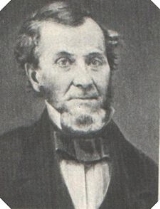
William Slade
Encyclopedia
William Slade jr. was an American
Whig
and Anti-Masonic
politician
.
He was born in Cornwall, Vermont
, May 9, 1786; attended the public schools, and was graduated from Middlebury College
in 1807; studied law; was admitted to the bar in 1810 and commenced practice in Middlebury; engaged in editorial work; established and was the editor of the Columbian Patriot 1814-1816; secretary of state of Vermont 1815-1822; judge of the Addison County Court; clerk in the Department of State, Washington, D.C.
from 1823 to 1829; elected as an Anti-Masonic candidate to the Twenty-second Congress to fill the vacancy caused by the death of Rollin C. Mallary
; reelected as an Anti-Masonic candidate to the Twenty-third and Twenty-fourth Congresses and as a Whig to the Twenty-fifth through Twenty-seventh Congresses and served from November 1, 1831, to March 3, 1843; reporter of decisions of the Vermont State supreme court in 1843 and 1844; Governor of Vermont 1844-1846; corresponding secretary of the Board of National Popular Education 1846-1859 (which he co-founded with Catharine Beecher
); died in Middlebury, Vermont, on January 18, 1859; interment in West Cemetery.
While a Representative, he reacted to the first attempt to introduce the Twenty First Rule
, which would have institutionalized the United States House of Representatives
' refusal to discuss slavery, Slade launched into an immediate filibuster, which delayed the passage of the bill by several days.
United States
The United States of America is a federal constitutional republic comprising fifty states and a federal district...
Whig
Whig Party (United States)
The Whig Party was a political party of the United States during the era of Jacksonian democracy. Considered integral to the Second Party System and operating from the early 1830s to the mid-1850s, the party was formed in opposition to the policies of President Andrew Jackson and his Democratic...
and Anti-Masonic
Anti-Masonic Party
The Anti-Masonic Party was the first "third party" in the United States. It strongly opposed Freemasonry and was founded as a single-issue party aspiring to become a major party....
politician
Politician
A politician, political leader, or political figure is an individual who is involved in influencing public policy and decision making...
.
He was born in Cornwall, Vermont
Cornwall, Vermont
Cornwall is a town in Addison County, Vermont, United States. It was founded November 3, 1761. The population was 1,136 at the 2000 census.-Geography:...
, May 9, 1786; attended the public schools, and was graduated from Middlebury College
Middlebury College
Middlebury College is a private liberal arts college located in Middlebury, Vermont, USA. Founded in 1800, it is one of the oldest liberal arts colleges in the United States. Drawing 2,400 undergraduates from all 50 United States and over 70 countries, Middlebury offers 44 majors in the arts,...
in 1807; studied law; was admitted to the bar in 1810 and commenced practice in Middlebury; engaged in editorial work; established and was the editor of the Columbian Patriot 1814-1816; secretary of state of Vermont 1815-1822; judge of the Addison County Court; clerk in the Department of State, Washington, D.C.
Washington, D.C.
Washington, D.C., formally the District of Columbia and commonly referred to as Washington, "the District", or simply D.C., is the capital of the United States. On July 16, 1790, the United States Congress approved the creation of a permanent national capital as permitted by the U.S. Constitution....
from 1823 to 1829; elected as an Anti-Masonic candidate to the Twenty-second Congress to fill the vacancy caused by the death of Rollin C. Mallary
Rollin Carolas Mallary
Rollin Carolas Mallary was a U.S. Representative from Vermont.Born in Cheshire, Connecticut, Mallary was graduated from Middlebury College in 1805....
; reelected as an Anti-Masonic candidate to the Twenty-third and Twenty-fourth Congresses and as a Whig to the Twenty-fifth through Twenty-seventh Congresses and served from November 1, 1831, to March 3, 1843; reporter of decisions of the Vermont State supreme court in 1843 and 1844; Governor of Vermont 1844-1846; corresponding secretary of the Board of National Popular Education 1846-1859 (which he co-founded with Catharine Beecher
Catharine Beecher
Catharine Esther Beecher was an American educator known for her forthright opinions on women's education as well as her vehement support of the many benefits of the incorporation of kindergarten into children's education....
); died in Middlebury, Vermont, on January 18, 1859; interment in West Cemetery.
While a Representative, he reacted to the first attempt to introduce the Twenty First Rule
Gag rule
A gag rule is a rule that limits or forbids the raising, consideration or discussion of a particular topic by members of a legislative or decision-making body.-Origin and pros and cons:...
, which would have institutionalized the United States House of Representatives
United States House of Representatives
The United States House of Representatives is one of the two Houses of the United States Congress, the bicameral legislature which also includes the Senate.The composition and powers of the House are established in Article One of the Constitution...
' refusal to discuss slavery, Slade launched into an immediate filibuster, which delayed the passage of the bill by several days.

